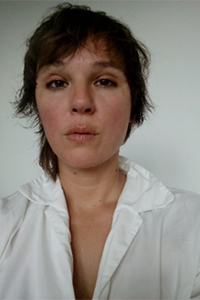- Our Students
- Alumni
- 2017
- Anja Kirschner
Techne
Anja Kirschner profile

Anja Kirschner
Supervisor(s)
Thesis
Anamersion: Traversing Structurations of Organismic and Technological Individuation with and through Unica Zürn, Kathy Acker and Porpentine Heartscape
About
My practise-led PhD research has led to the development of what I name anamersion: a queer-feminist, decolonial aesthetic and analytic which engages with the structuration of organismic and technological individuation and their limits. I have elaborated the notion of anamersion with and through three key references: Unica Zürn’s figuration of the entanglement of the (female) body and its institutionalisation in her illustrated text The House of Illnesses; Kathy Acker’s conception of the labyrinth “as a potential form of all bodies and their writing” (Martin), and Porpentine Heartscape’s computer games set in haunted mansions, which engage with trauma from an implicated perspective. Building on the aesthetic, analytic and linguistic significance of these references for a contemporary understanding of the entanglements of bodies, technologies and imaginaries, I approach the immersive, navigational and environmental aesthetics of Virtual Reality (VR) and computer gaming through modes of drawing, mapping and filmmaking that respond to the radicality of Zürn, Acker and Porpentine’s disruptions of normative anatomical, architectural and textual figurations on my own terms. This has resulted in several drawings and video installations which explore the ana-material domain (Golding) of contemporary lifeforms and the technological, organismic and phantasmal (Harrell) ecologies that subtend them. Through this research practice I have defined anamersion as attending to artifice in it’s capacity to unsettle rather than extend the self (Colebrook), and as such challenge conceptions of technology as supplement and extension of the human (Stiegler), which are predicated on modern, humanist notions of the self, as self-possessed and self-making (Stakemeier) and carry over genre-specific definitions of the human (Wynter) and artifice as the latter’s extension, into normative posthumanisms (Jackson), with deadly consequences. I offer anamersion as way of traversing and unsettling the spaces of subjectivisation produced by immersive technologies and attendant broader notions of the “immersion of mind in life” (Colebrook), in which power operates through modulation and co-option, encompassing conscious, unconscious and non-conscious processes (Hayles), and as such is less likely to manifest as external constraint and coercion (Väliaho) than as internal limit (personal failure to adapt and expand, leading to breakdown). I demonstrate how anamersion as an analytic and aesthetic traverses (in the sense of “crossing with difficulty, going against”) normative structurations of organismic and technological individuation from immersed and implicated positions, without ushering the genre-specific figures of self-possession and self-making back in. My research is informed by thinkers in the humanities who approach the human and the artificial from predominantly queer feminist and/or African diasporic perspectives, in particular Zakiyyah Iman Jackson, Claire Colebrook, Sylvia Wynter and Louis Chude-Sokei, whose attention to the role of literature in the formation and disruption of humanist and posthumanist narratives provides exceptionally robust ways in which to approach the writings of Zürn, Acker and Porpentine and provides coordinates for the queer-feminist and decolonial framework of anamersion.